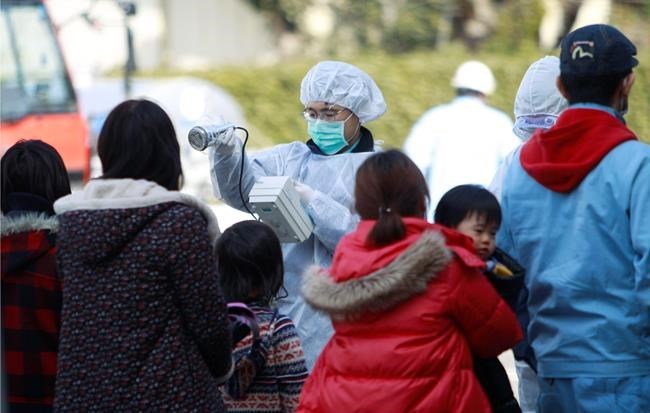
FILE - In this March 13, 2011 file photo, residents evacuated from the areas surrounding the tsunami-damaged Fukushima Dai-ichi nuclear power plant are checked for radiation exposure in Koriyama, Fukushima Prefecture, northeastern Japan. An aid group says a child diagnosed with thyroid cancer after the Fukushima nuclear accident is missing from government checkup records. Japanese authorities have said none of those diagnosed with thyroid cancer since the 2011 meltdowns was under 5 at the time. They've said that suggests the cases are not related to nuclear-plant radiation. The aid group, however, says one child was 4, and that case is missing from government data. (AP Photo/Wally Santana, File)
Republished March 30, 2017 - 11:53 PM
Original Publication Date March 30, 2017 - 8:35 PM
TOKYO - A child diagnosed with thyroid cancer after the Fukushima nuclear accident is missing from government checkup records, an aid group said Friday, raising questions about the thoroughness and transparency of the screenings.
Japanese authorities have said that among the 184 confirmed and suspected cases of thyroid cancer in Fukushima, no one was under age 5 at the time of the 2011 meltdowns. They've said that suggests the cases are not related to nuclear-plant radiation, as many were after the 1986 Chornobyl disaster.
The 3.11 Fund for Children With Thyroid Cancer, however, said Friday that one child who was 4 when the meltdowns occurred has been diagnosed with thyroid cancer. That case is not listed in data from Fukushima Medical University, which is overseeing thyroid-cancer screening and surgeries and had treated the child.
Hisako Sakiyama, a medical doctor and representative of the 3.11 Fund, which gives aid to families of children diagnosed with thyroid cancer, said that any missing case is "a major problem," and raises the possibility that others may also be missing from the data.
The university has been carrying out ultrasound screenings of some 300,000 youngsters in Fukushima 18 and younger at the time of the nuclear accident. It has repeatedly said it stands behind its data but declined to comment on individual cases, citing privacy concerns.
Seisho Tanaka, a spokesman for the screenings, said those who may have had tested negative could have developed cancer afterward and sought medical treatment outside the screening process. He declined to comment further.
The officials have argued the Fukushima cases are popping up because of "a screening effect," meaning the meticulous testing uncovered cases that would not be known otherwise.
Sakiyama, who has sat on a legislative panel investigating the Fukushima nuclear disaster, said the screening system was flawed. The child, a boy now 10, and one of the fund's aid recipients, had surgery at Fukushima Medical University last year and is receiving treatment there, making it difficult to think the university could be unaware of the case, she added.
"It is very puzzling how they would not want to come forward with the case," she said, adding of the Fukushima cases and radiation: "There is no reason to outright deny the link."
The boy, who continues to receive treatment from the hospital, and his family have not spoken publicly.
Thyroid cancer is usually not fatal with proper treatment. It's extremely rare among children and young adults under normal conditions, but since young people are not typically screened for it, it can go undetected for years.
Of the thousands of thyroid cancer cases that surfaced after Chornobyl, in the Ukraine and Belarus, about half or about 15 per cent, depending on the study, were those under age 5 at the time of the accident.
Keith Baverstock, professor at the University of Eastern Finland and an expert on health and radiation, thinks it's important Fukushima medical records be transparent.
Although it's still difficult to reach a conclusion on a link with radiation, studying the cancers and how they developed can shed light on the question, he said recently in a Skype call.
___
Follow Yuri Kageyama on Twitter at https://twitter.com/yurikageyama
Her work can be found at http://bigstory.ap.org/content/yuri-kageyama
News from © The Associated Press, 2017